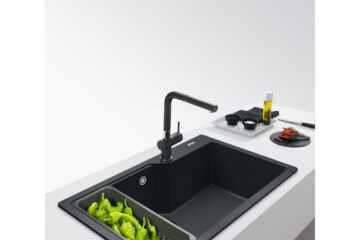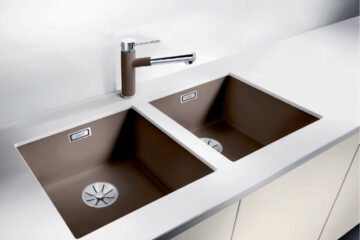The kitchen sink is subject to daily attacks from limescale, stains and chemicals. It must therefore be cleaned regularly to ensure its longevity. It should be pointed out, however, that the care required for each type of sink is not the same. It all depends on the material it is made of. Below are some tips on how to efficiently take care of your kitchen sink.
Daily cleaning

Before discussing each material, it is necessary to clarify that the kitchen sink must be cleaned daily and after each use. In this way, there is no risk for microbes and limescale to develop. With a few simple steps every day, your sink will look great for years to come, no matter the quality. For daily cleaning, all you need is a sponge and some soapy water. If the water in your area has a high percentage of limescale, you should add white vinegar.
Discover a wide range of kitchen sinks
Cleaning a stainless steel sink
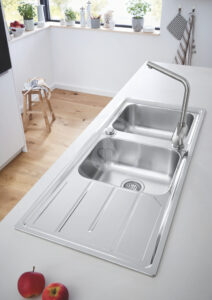
Stainless steel sinks are very popular among industry professionals because of their high temperature resistance. However, it must be said that stainless steel is very sensitive to limescale. This means that, without regular maintenance, it can quickly lose its shiny appearance. You should therefore clean it every day with soap and water. For maintenance, you will need hot water and white vinegar. After mixing, apply immediately to the sink with a sponge. Leave it on for 20 minutes before rinsing with water. Do not forget to wipe with a soft cloth to remove any traces of limescale. Never use abrasive products or bleach on a stainless steel sink.
Selection of stainless steel sinks at reduced prices
Cleaning a granite sink
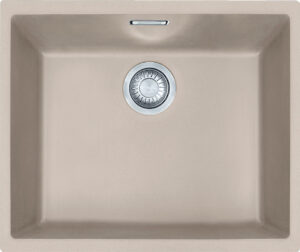
Granite sinks are characterised by their ease of maintenance. That’s why Franke’s Fragranit+ sinks have become the benchmark for granite sinks worldwide. They are extremely resistant and have an incomparable durability. You can even clean them with abrasive products safely. In addition, this type of sink also benefits from an antibacterial treatment, which makes it highly hygienic. Microbes and bacteria have no chance to grow. Cleaning can be done with any scouring cream or black soap. If the stains on your granite sink persist, you can use a sponge soaked in water with clay stone. It will look brand new.
Cleaning a ceramic sink
A ceramic sink is very easy to maintain. This is due to its high resistance to scratches, extreme temperatures and impacts. For maintenance, all you need to do is use soapy water or the cleaning products you normally use. You can also use elbow grease on a sponge. To fight stubborn stains, don’t hesitate to use white vinegar, clay stone or lemon. Limescale marks can be removed with tartar control toothpastes.
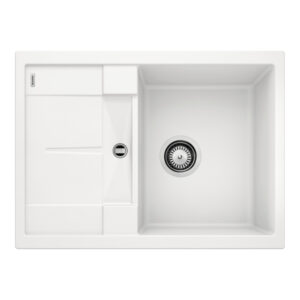
If your ceramic sink is scratched, simply wipe it with a damp cloth and baking soda. This will restore its former shine. However, you should avoid using anti-limescale or anti-rust products, as you risk damaging the enamel. Very aggressive acid or soda-based products should be avoided at all costs, as should steel wool sponges.
Cleaning a resin sink
Resin sinks require special care. Indeed, this type of sink is quite sensitive to high temperatures. It is therefore strongly recommended that you do not pour boiling water into the bowl. You should also avoid using certain acidic products such as lemon and vinegar, as there is a risk of discolouring the resin. Bleach should also be avoided at all costs. Black soap is recommended to get rid of grease. If the stains are stubborn, you can use household alcohol diluted with water.
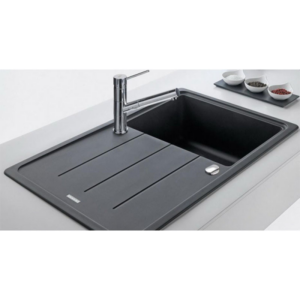
As the resin sink is very sensitive to scratches, it is not uncommon for it to be damaged by abrasive products or be scratched by pots. For this reason, you should use scouring cream with a sponge. As a safety precaution and to avoid premature damage to your resin sink, avoid placing very hot pans or pots on it. If your sink has a lot of very persistent stains, pour about 3 litres of water into the sink and add 10 spoons of yeast. After several hours, or even overnight, rinse with water. You will have a brand new resin sink.
Maintaining your taps
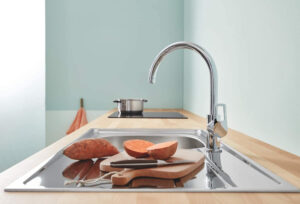
Tapware cannot be separated from the kitchen sink: they are two complementary elements. Therefore, you should not forget to maintain the sink tap regularly. If the tap is very dirty, it is sufficient to use methylated spirits which you can apply to the tap with the help of a cloth. A little lemon juice will remove any traces of limescale. To restore the shine to your kitchen tap, don’t hesitate to coat it with cooking oil.
Some good habits to adopt
Maintaining a kitchen sink does not have to be a tedious job. All it takes is a few basic practices that will gradually become habits. Maintenance is above all a question of hygiene and cleanliness. However, it is also about identifying various anomalies. If, for example, you notice that the water in the sink is not flowing properly, this means that there is a blockage somewhere. You should intervene immediately.
To prevent limescale deposits, you can use white vinegar. This solution is both inexpensive and environmentally friendly. As the drainage system is never safe from limescale deposits and food or soap debris, pour baking soda down the drain a few times. This can help you avoid certain problems.
